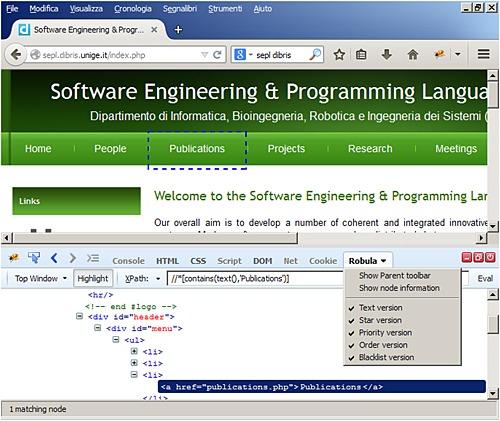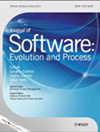下载PDF
{"title":"Robula+:为web测试生成健壮的XPath定位器的算法","authors":"Maurizio Leotta, Andrea Stocco, Filippo Ricca, Paolo Tonella","doi":"10.1002/smr.1771","DOIUrl":null,"url":null,"abstract":"<p>Automated test scripts are used with success in many web development projects, so as to automatically verify key functionalities of the web application under test, reveal possible regressions and run a large number of tests in short time. However, the adoption of automated web testing brings advantages but also novel problems, among which the test code fragility problem. During the evolution of the web application, existing test code may easily break and testers have to correct it. In the context of automated DOM-based web testing, one of the major costs for evolving the test code is the manual effort necessary to repair broken web page element locators – lines of source code identifying the web elements (e.g. form fields and buttons) to interact with.</p><p>In this work, we present <span>Robula+</span>, a novel algorithm able to generate robust XPath-based locators – locators that are likely to work correctly on new releases of the web application. We compared <span>Robula+</span> with several state of the practice/art XPath locator generator tools/algorithms. Results show that XPath locators produced by <span>Robula+</span> are by far the most robust. Indeed, <span>Robula+</span> reduces the locators' fragility on average by 90% w.r.t. absolute locators and by 63% w.r.t. Selenium IDE locators. Copyright © 2016 John Wiley & Sons, Ltd.</p>","PeriodicalId":48898,"journal":{"name":"Journal of Software-Evolution and Process","volume":"28 3","pages":"177-204"},"PeriodicalIF":1.7000,"publicationDate":"2016-03-09","publicationTypes":"Journal Article","fieldsOfStudy":null,"isOpenAccess":false,"openAccessPdf":"https://sci-hub-pdf.com/10.1002/smr.1771","citationCount":"63","resultStr":"{\"title\":\"Robula+: an algorithm for generating robust XPath locators for web testing\",\"authors\":\"Maurizio Leotta, Andrea Stocco, Filippo Ricca, Paolo Tonella\",\"doi\":\"10.1002/smr.1771\",\"DOIUrl\":null,\"url\":null,\"abstract\":\"<p>Automated test scripts are used with success in many web development projects, so as to automatically verify key functionalities of the web application under test, reveal possible regressions and run a large number of tests in short time. However, the adoption of automated web testing brings advantages but also novel problems, among which the test code fragility problem. During the evolution of the web application, existing test code may easily break and testers have to correct it. In the context of automated DOM-based web testing, one of the major costs for evolving the test code is the manual effort necessary to repair broken web page element locators – lines of source code identifying the web elements (e.g. form fields and buttons) to interact with.</p><p>In this work, we present <span>Robula+</span>, a novel algorithm able to generate robust XPath-based locators – locators that are likely to work correctly on new releases of the web application. We compared <span>Robula+</span> with several state of the practice/art XPath locator generator tools/algorithms. Results show that XPath locators produced by <span>Robula+</span> are by far the most robust. Indeed, <span>Robula+</span> reduces the locators' fragility on average by 90% w.r.t. absolute locators and by 63% w.r.t. Selenium IDE locators. Copyright © 2016 John Wiley & Sons, Ltd.</p>\",\"PeriodicalId\":48898,\"journal\":{\"name\":\"Journal of Software-Evolution and Process\",\"volume\":\"28 3\",\"pages\":\"177-204\"},\"PeriodicalIF\":1.7000,\"publicationDate\":\"2016-03-09\",\"publicationTypes\":\"Journal Article\",\"fieldsOfStudy\":null,\"isOpenAccess\":false,\"openAccessPdf\":\"https://sci-hub-pdf.com/10.1002/smr.1771\",\"citationCount\":\"63\",\"resultStr\":null,\"platform\":\"Semanticscholar\",\"paperid\":null,\"PeriodicalName\":\"Journal of Software-Evolution and Process\",\"FirstCategoryId\":\"94\",\"ListUrlMain\":\"https://onlinelibrary.wiley.com/doi/10.1002/smr.1771\",\"RegionNum\":4,\"RegionCategory\":\"计算机科学\",\"ArticlePicture\":[],\"TitleCN\":null,\"AbstractTextCN\":null,\"PMCID\":null,\"EPubDate\":\"\",\"PubModel\":\"\",\"JCR\":\"Q3\",\"JCRName\":\"COMPUTER SCIENCE, SOFTWARE ENGINEERING\",\"Score\":null,\"Total\":0}","platform":"Semanticscholar","paperid":null,"PeriodicalName":"Journal of Software-Evolution and Process","FirstCategoryId":"94","ListUrlMain":"https://onlinelibrary.wiley.com/doi/10.1002/smr.1771","RegionNum":4,"RegionCategory":"计算机科学","ArticlePicture":[],"TitleCN":null,"AbstractTextCN":null,"PMCID":null,"EPubDate":"","PubModel":"","JCR":"Q3","JCRName":"COMPUTER SCIENCE, SOFTWARE ENGINEERING","Score":null,"Total":0}
引用次数: 63
引用
批量引用


 求助内容:
求助内容: 应助结果提醒方式:
应助结果提醒方式:


